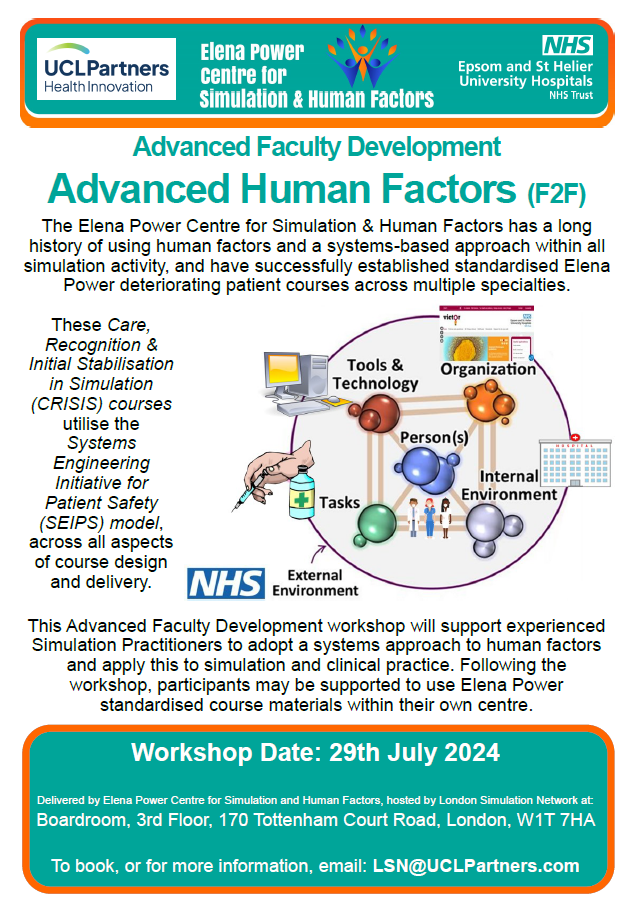Learning together- The London Simulation Network Advanced Human Factors Workshop.
The Elena Power Centre for Simulation & Human Factors has a long history of using human factors and a systems-based approach within all simulation activity and have successfully established standardised Elena Power deteriorating patient courses across multiple specialties.
These Care, Recognition & Initial Stabilisation in Simulation (CRISIS) courses utilise the Systems
Engineering Initiative for Patient Safety (SEIPS) model, across all aspects of course design and delivery.
In January 2023, Health Education England approached the London Simulation Network to ask if any centres would like to submit expressions of interest to develop Advanced Faculty Development modules for Simulation-based education (SBE). The modules were to take the form of an e-learning package with an associated workshop. It was anticipated that the opportunity to play a significant role in the development of Advanced SBE modules for London and the National Faculty Development Programme may also result. The Elena Power Centre were subsequently commissioned to develop two modules, including an Advanced Human Factors module. Design began immediately, with the e-learning and workshop to be delivered in 2023/4.

Having completed the introductory e-learning package, this Advanced Human Factors Workshop supported experienced Simulation Practitioners to adopt a systems approach to human factors and apply this to simulation and clinical practice. Following the workshop, participants will be encouraged to use Elena Power standardised course materials within their own centre.

The workshop was for Faculty actively involved in the delivery of simulation-based education, who have an interest in incorporating systems thinking principles and human factors across all aspects of course design and delivery.
27 attendees attended from 11 of trusts across the region, as learning together event.
Intended Learning Outcomes
· Consider systems thinking principles within the context of simulation activity as well as real world relevance.
· Understand the theory of the Systems Engineering Initiative for Patient Safety (SEIPS) Model as well as the concept of Performance Influencing Factors (PIFs).
· Apply the SEIPS model to identify PIFs in a clinical scenario.
· Understand how to use SEIPS to design PIFs in simulation scenarios.
· Understand the principles behind the Epsom & St Helier Systems Diamond debrief approach.
· Understand and teach simple human performance influencing factors with a systems thinking mindset. Give and receive simple feedback.
· Understand the contents of the post-course toolkit, how this can be used in your simulation service, and the further support available.
Feedback from the session
The workshop was reviewed positively with attendees leaving the following feedback.
‘I found the SEIPS training really applicable. I enjoyed the SEIPS worksheet and thought it would be useful to use for note taking when observing sim’
‘I think by watching with a SEIPS lens I will be able to enquire authentically using the SEIPs model’
‘This was really useful and helped me understand the model so much better and look at it in much more detail through a simulation lens’
The micro-teach component of the workshop was felt could be more structured and benefit from a demonstration nevertheless the majority of attendees were motivated to take the resources and models discussed in the workshop back to their organisation for implementation further discussion. For further support, attendees were invited to attend the Elena Power Centre in future to observe and use tools in practice during simulation courses.
E-Learning.
The e-learning should take a maximum of 30 minutes to complete and is available using here:
E-learning: Introduction to the Systems Engineering Initiative for Patient Safety (SEIPS) model
Additional Resources
Below are the other resources shared on the day with attendees:
Systems Thinking for Everyday Work
Chartered Institute of Ergonomics &Human Factors (CIEHF)- What is Ergonomics
SKYbrary Aviation Safety – Systems Thinking for Safety: Ten Principles
NHS England- SEIPS Quick Reference Guide & Work Systems Explorer